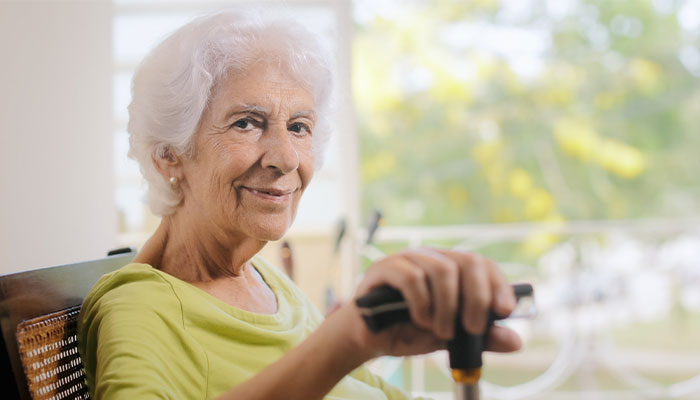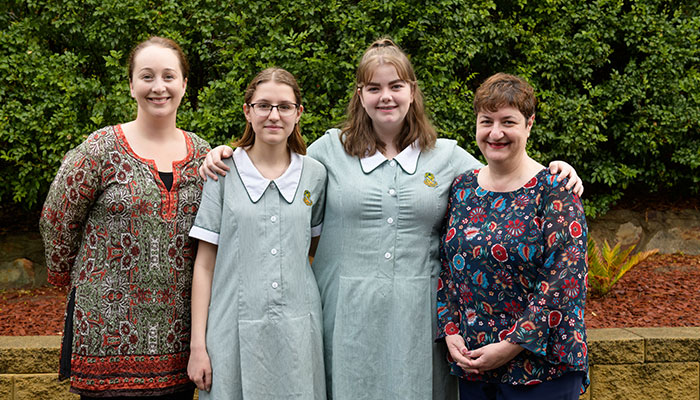As lockdowns lurch on with around half the Australian population subject to stay-at-home orders, there’s growing evidence that older people experience better mental health and wellbeing during the COVID-19 pandemic than their younger counterparts.

I'm OK: Findings that older adults are coping well reinforces the conclusion that age is associated with greater psychological resilience in the face of crises, says Professor Wuthrich.
Recent research by Macquarie University psychologists has measured the mental, social and physical wellbeing impacts of COVID-19 on older adults across a range of samples.
“Overall, we are finding that while many older adults reported low mood and worry, it is not as severe as might be expected, and that in many cases older adults were coping well,” says Professor Viviana Wuthrich, Director of Macquarie University’s Centre for Ageing, Cognition and Wellbeing.
Wuthrich says this is consistent with research globally and reinforces the conclusion that age is associated with greater psychological resilience in the face of crisis.
“Research findings right across the world are demonstrating time and time again, that people in their 60s and over have been more resilient [from a mental health and psychological wellbeing perspective] during this pandemic,” she says.
Risks higher but satisfaction greater
Wuthrich cites a US study which sampled 945 people between the ages of 18 and 76 in March 2020 and found that older respondents had better emotional wellbeing than those who were younger.
“Even though older people understood they were at greater risk if they got COVID, that they could die or have serious complications – they still reported better mental health and better wellbeing,” she says.
The study was replicated with more than 5000 people in August 2020 with consistent results, she says.
“We've seen the same effects from studies in Spain, Canada and the Netherlands, and all found that older people were doing better than younger people.”
Although people reported being more isolated and more lonely, it wasn’t impacting greatly on levels of anxiety and depression.
Wuthrich says that many of the studies found that there was an increase in loneliness for many older adults as they aged.
“But these studies also found that although people reported being more isolated and more lonely, it wasn’t impacting greatly on levels of anxiety and depression,” she says.
Another small study conducted in Sydney involved a review of people who had previously been treated in clinical trials by Macquarie University, she says.
- Was activist Bill Onus our first Aboriginal film-maker?
- Saving the bees: $300,000 grant for early warning system in hives
“We contacted people that we had previously successfully treated for anxiety or depression disorders three to five years ago, who we thought would be more vulnerable during the pandemic,” she says.
“We found to our surprise that most of these people were doing really well and we didn't see the relapse rates that we had expected.
“People were sustaining good mental health despite the challenges associated with the initial lockdowns and sometimes quite challenging circumstances that were happening in the first half of 2020.”
Grandchildren and technology are protective factors
Wuthrich says that the team also looked for factors that were associated with the strongest levels of resilience.

Plus side: People maintaining contact with grandchildren and using technology were experiencing better mental health during lockdown, research showed.
“We found that living with someone else, rather than living alone, was protective,” she says.
“We also found that another strong predictor of whether older people were resilient was about how much contact they had with their grandchildren.
“Those older people who were maintaining contact with grandchildren, whether via telephone or video conferencing, or in some cases, still face-to-face, were experiencing better mental health,” she says.
The other protective factor was a greater use of technology.
“We found that older people who were maintaining social contact and a wider interest in the world through technology had better emotional wellbeing.”
Bigger picture
Wuthrich says that there’s a strong body of research across different cultures and demographics which demonstrates that older people have better mental health and wellbeing than young people.
“As people get older, they tend to have more positive emotions in their day and dwell less on negative emotions, and become better at adapting and accepting adverse situations,” she says.
“Part of this is an ability to draw on previous life experience and to draw on the knowledge that they have got through difficult situations before.”
- Virtuous dobbing: Why reporting pandemic rule-breakers is a social good
- Stress-busting tips for HSC students facing lockdown learning
Wuthrich says that these adaptive strategies include a tendency by many older people to avoid putting themselves into stressful situations.
“There’s also findings that as people get older, they are more satisfied with their life, partly due to a modal shift in their motivation about what they think is important in life,” she says, adding that this explains the finding that those who coped best during lockdowns had more contact with their grandchildren.
“Younger people tend to focus more on longer-term values and aspirations – and these are things that may look like they will fundamentally change during a pandemic, rather than the day-to-day events.”

Dr Viviana Wuthrich (pictured) is a Professor in the School of Psychology and Cognitive Sciences and Director of the Centre for Ageing, Cognition and Wellbeing.
Help is available nationally for older adults struggling to cope through current clinical trials of the Ageing Wisely program funded by the NHMRC and Beyond Blue. More information at: www.tiny.cc/STOP-Study and www.tiny.cc/SPAA-Study



